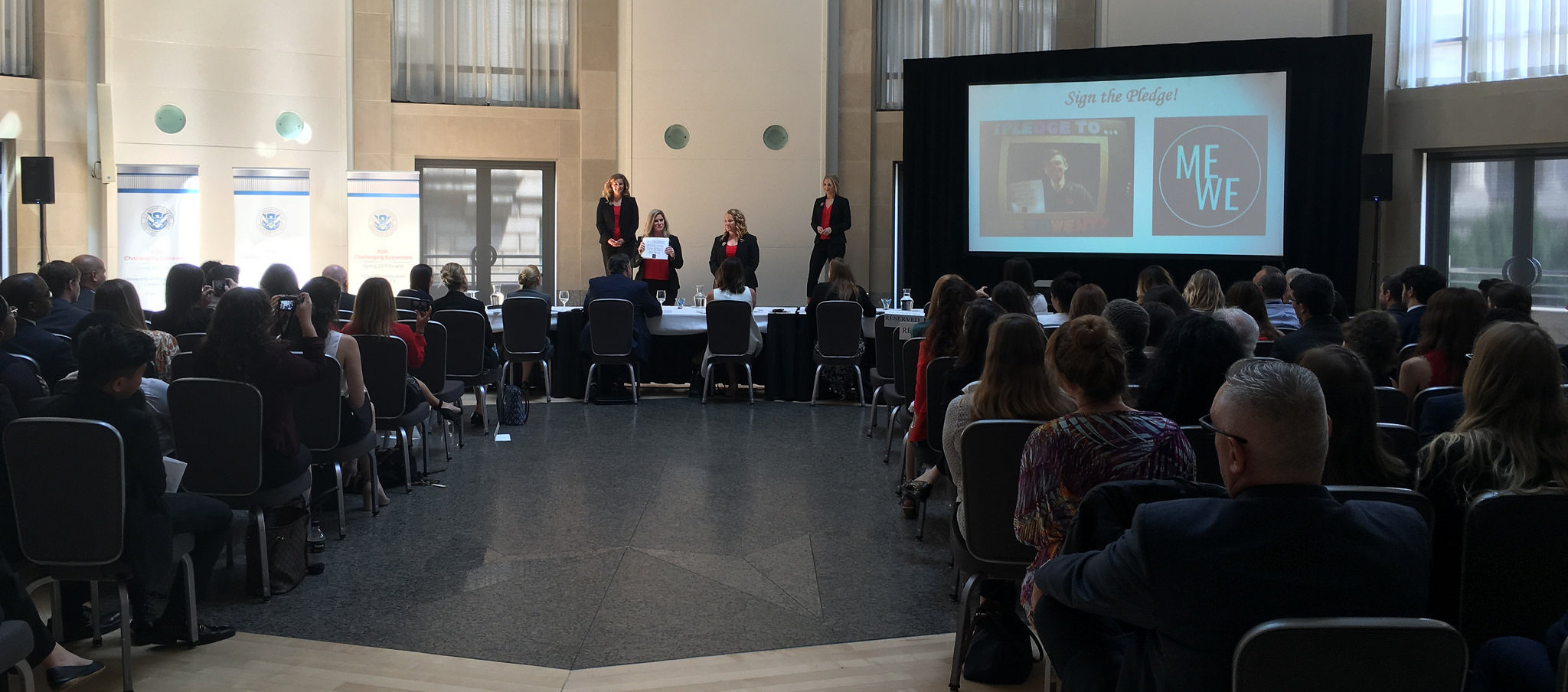
Valenti Students Get Public to ‘Speak Up’ About Attitudes towards Muslim Immigration
July 27, 2017
Understanding Publics graduate class crafts powerful campaign that garners national recognition
Feature article by Jenna De Los Santos
Disagreement doesn’t equal hate.
This is the slogan that Me to We HTX stands by – and it is powerful.
Me to We HTX is a strategic campaign designed by a team of graduate students at the Valenti School of Communication who “identify with many different ideologies and religions, and come from diverse backgrounds.” Together, they crafted a campaign that challenges the Muslim immigration narrative.
“This tagline reinforces the idea that people can have different beliefs while simultaneously carrying on civil conversations regarding those beliefs,” said Haley Hart, a graduate public relations student.
Me to We HTX was designed for the global Peer to Peer – Challenging Extremism initiative, which was organized by EdVentures and hosted by the Department of Homeland Security. The initiative calls for students to create and execute communication campaigns that resonate with their peers.
While 45 groups participated this year, only three advanced to the finals. Me to We HTX was one. On Tuesday, July 18, the team went to Washington, D.C. to present their project on a national stage in front of senior leaders, policymakers, and guests from DHS, Facebook, and other organizations. They placed third, the first team to ever place on their first try. As a result of their participation, the campaign secured a small donation and $1,000 scholarship for the Valenti School of Communication.
Understanding publics through a well-researched campaign
Dr. Lan Ni, an Associate Professor in the Valenti School of Communication who specializes in public relations and strategic communication, was the campaign advisor. A deep-seated passion for immigration-related issues led Dr. Ni to galvanize a team of graduate students. As part of her Understanding Publics class, they created the Me to We campaign.
“We began conducting interviews with college-age students, did research on the best channels and strategies to use during our campaign and came up with a plan based on that research,” said LeAnn Tobola, another graduate student who worked on the campaign.
Though immigration is a polarizing issue, Me to We’s research uncovered that a large, silent majority exists. A key strategy of the campaign was to engage this silent majority and encourage them to speak up about their opinions.
From the research, both online and offline strategies emerged for the campaign. The first online strategy was creating a website for this campaign. Next the team launched Facebook, Twitter, and Instagram accounts for increased exposure. These platforms were used to distribute unbiased facts and findings on terrorism, counter extremism measures and Muslim integration. The team also recorded interviews with important stakeholders – such as a TV producer and a religious leader – and disseminated them on the campaign’s social media pages.
Offline, the team organized a host of events and discussions with subject experts. One major event was the Big Talk on Countering Violent Extremism, which featured seven panelists from backgrounds ranging from the FBI to religious communities. Each spoke about countering violent extremism and offered a unique point of view on attitudes towards immigration.
“We are hoping that the individual Me’s can stand together to try to fight the hate and prejudice against other people so we can stand together to become the We,” said Dr. Ni.
Impressive Results
Nearly 200 people attended the Big Talk on Extremism. The post campaign results portrayed an overall effectiveness in changing perceptions about Muslim immigration into the United States.
After the campaign, 3% more respondents recognized polarized opinions as a problem, 14% more felt personal involvement in the issue and 7% more believed they could make a difference addressing the issue. Most substantial, research showed a 58% increase in peoples’ willingness to speak up in public and with friends regarding immigration.
“What made this campaign important was that people were actually looking up where they were getting their news and not trusting everything that they read,” said Tobola.
Looking Forward
This competition helped students gain career-building, real life experience and skills that can transform future careers.
Still, to most of the students, the importance of this campaign extends far beyond the competition and classroom.
“I can say with assurance that executing this campaign pushed us to become more reflective as to who we are and how our views affect those around us,” said Hart.

Me to We team presented their project to senior leaders, policymakers, and guests from DHS, Facebook, and other organizations in Washington, D.C. as part of the global Peer to Peer – Challenging Extremism initiative,